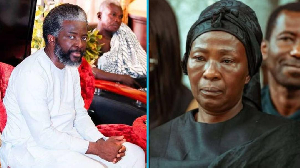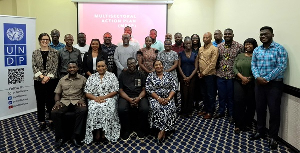The African Court on Human and Peoples' Rights has dismissed a human rights appeal brought against the country, by one Dexter Eddie Johnson who was convicted and sentenced to death for murder and currently on death row awaiting execution.
The African Court in its ruling on March 28 obtained by the Ghana News Agency said the Application does not fulfil the admissibility requirement under Article 56 (7) of the African Charter, which is also reflected in Rule 4O (7) of the court’s rules.
The African Court recalls that the conditions of admissibility under Article 56 of the Charter are cumulative and as such, when one of them is not met, then the entire application must fail.
“ln the instant case, since the application does not meet the requirement set forth in Article 56(7) of the Charter; the Court dismissed the application as inadmissible
The African Court was composed of: Justice Sylvain Ore, President; Justice Ben Kioko, Vice-President; Justice Rafad Ben Achour; Justice Angelo V. Matusse; Justice Suzanne Mengue; Justice Tujilane R. Chizumila; Justice Chafika Bensaoula; Justice Blaise Tchikaya; Justice Stella I. Anukam; and Justice Imani D. Aboud.
Dexter Eddie Johnson was represented by Saul Lehrfreund, Co-Executive Director, The Death Penalty Project.
Ghana was represented by Miss Gloria Afua Akuffo, Attorney General and Minister of Justice; Mr Godfred Yeboah Dame, Deputy Attorney General and Deputy Minister of Justice; Mrs Helen A. A. Ziwu, Solicitor General; and Mrs Yvonne Atakora Obuobisa, Director of Public Prosecutions.
According to the facts of the case, Johnson holds a dual nationality of Ghana and Great Britain.
He was convicted and sentenced to death on June 18, 2008 by a Fast Track High Court in Accra for the murder of an American national on May 27, 2OO4, at a village near Ningo in the Greater Accra Region of Ghana. The was brought to trial where he denied the offence but after a full trial, he was convicted and sentenced accordingly.
The applicant appealed against his conviction and sentence at the Court of Appeal, arguing that while the death penalty per se is authorised by Article 13(1) of the Constitution of Ghana, the mandatory imposition of the death sentence, on which the Constitution was silent, was unconstitutional.
He asserts that the mandatory death penalty violates the right not to be subjected to inhuman and degrading treatment or punishment, the right not to be arbitrarily deprived of life and the right to a fair trial, all of which are protected by the 1992 Constitution.
However on July 16, 2009, the Court of Appeal dismissed the appeal both on the conviction and sentence but the applicant further pursued his appeal against at the Supreme Court and on March 16, 2011 his appeal was, again, dismissed.
Subsequently, in December 2011 and April 2012, respectively, the applicant made two clemency petitions to the President of Ghana.
Now in July 2012, the applicant filed a communication to the United Nations Human Rights Committee (HRC) under the First Optional Protocol to the International Covenant on Civil and Political Rights.
On March 27, 2014, the HRC found, in its views, that since the only punishment for murder under Ghanaian law was the death penalty, the courts had no discretion but to impose the only sentence permitted by law.
General News of Friday, 26 April 2019
Source: ghananewsgency.org













